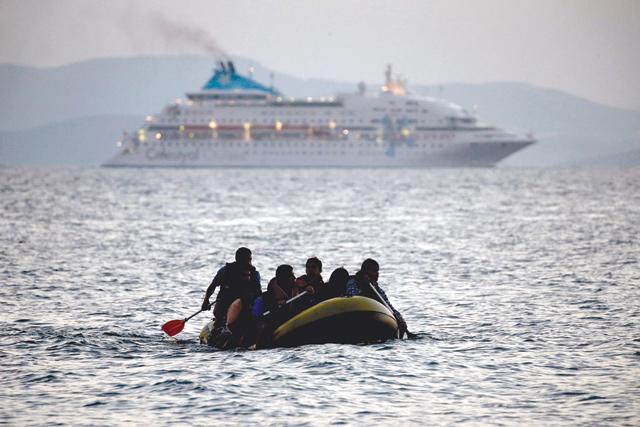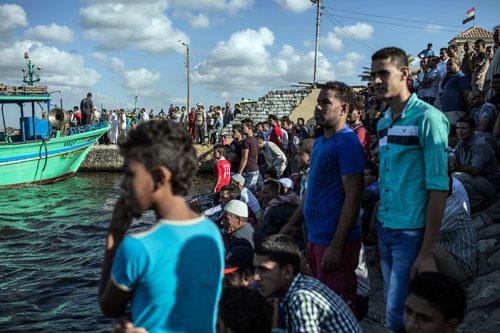You are here
Deadliest first quarter for central Med migrants since 2017 — UN
By AFP - Apr 12,2023 - Last updated at Apr 12,2023

Migrants wait on the side of a street after Tunisian police dismantled a makeshift camp for refugees from sub-Saharan African countries in front of the UNHCR headquarters in Tunis on Tuesday (AFP photo)
GENEVA — January to March 2023 was the deadliest first quarter for migrants crossing the central Mediterranean since 2017, the United Nations said on Wednesday, with 441 lives lost attempting to reach Europe.
The UN's International Organisation (IOM) for Migration said delays in state-led search and rescue (SAR) operations were a factor in several fatal incidents in the perilous crossing from north Africa.
And the IOM said the 441 known deaths in the first three months of the year was likely an undercount of the true number.
"The persisting humanitarian crisis in the central Mediterranean is intolerable," said IOM chief Antonio Vitorino.
"With more than 20,000 deaths recorded on this route since 2014, I fear that these deaths have been normalised," he added.
"States must respond. Delays and gaps in state-led SAR are costing human lives."
The IOM said delays in such rescues were a factor in at least six incidents so far this year, leading to the deaths of at least 127 people.
"The complete absence of response to a seventh case claimed the lives of at least 73 migrants," it said in a statement, adding that non-governmental organisations' search and rescue efforts have markedly diminished in recent months.
"Over the Easter weekend, 3,000 migrants reached Italy, bringing the total number of arrivals so far this year to 31,192 people," the IOM said.
The UN agency's Missing Migrants Project is also investigating several reports of cases in which boats were reported missing, where there are no records of survivors, no remains and no SAR operations.
The fates of more than 300 people aboard those vessels remain unclear, the organisation said.
'Ad hoc response'
"Saving lives at sea is a legal obligation for states," said Vitorino.
"We need to see proactive, state-led coordination in search-and-rescue efforts. Guided by the spirit of responsibility sharing and solidarity, we call on states to work together and work to reduce loss of life along migration routes."
The IOM said the situation in the central Mediterranean reinforced the need for predictable state-led SAR, putting an end to the "ad hoc response" since the end of the Italian navy's Operation Mare Nostrum in 2014.
Countries needed to support the life-saving efforts of NGOs and end the “criminalisation, obstruction and deterrence” of those who do come to the rescue, it said.
“All maritime vessels, including commercial ships, have a legal obligation to provide rescue to boats in distress,” it added.
The agency also called for tougher action to dismantle criminal smuggling networks and to prosecute those responsible for “profiting from the desperation of migrants and refugees by facilitating dangerous journeys”.
Even as the IOM released its findings, the Tunisian coast guard said on Wednesday that 10 migrants had drowned off the coast after their boat was wrecked in the Mediterranean.
“Seventy-two migrants were rescued and 10 bodies recovered after Tuesday’s shipwreck” off Tunisia’s second city of Sfax, spokesman Houssem Jebabli said, adding that the dead were all from Sub-Saharan Africa.
Related Articles
GENEVA — The number of people who have died trying to cross the Mediterranean nearly doubled in the first half of 2021, the International Or
CAIRO — Thirty-three bodies were recovered on Tuesday as a wreck of boat that sank off Egypt last week with hundreds of migrants aboard was
ATHENS — At least 78 migrants died after their fishing boat sank off the Peloponnese, Greece’s coast guard said on Wednesday, as fears mount













